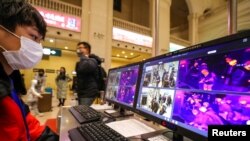Student Union
Students from Wuhan Traveling Globally for Holidays

International students remaining in Wuhan, China — where the government has issued a lockdown to avoid the spread of the deadly coronavirus — report being provided surgical masks and being asked to stay indoors.
“As I write this message, the school is on lockdown as the school authorities are putting in place measures to protect the remaining foreign students on campus,” emailed an international student who identified himself as @Vince Vela Nova from Ghana who is doing a post-graduate degree program in land resource management.“
There are just a handful of Chinese students around as most of them have gone back home to celebrate the Chinese New Year,” he wrote. “This morning the international office provided the students with surgical masks and entreated every one of us to stay indoors.”
Medical students from India training in Wuhan have been advised to stay home and away from their hospital workplace, according to the Hindustan Times. While about 600-700 medical students from India study in Wuhan, most have returned home for the winter-New Year’s break from school.
A 45-year-old teacher from India working at an international school has been admitted to the hospital with flu-like symptoms, reported the Telegraph.
The outflow of international students to points around the globe for winter break has caused rapid anxiety.
"My niece is stuck in Wuhan China, with airport closed she can't travel to India," tweeted @harinatha with a video showing a van blocking a roadway. "Please get Indian citizens safely back to India till this virus crisis is over? Few more Indian students, not knowing what to do! University Roads blocked, Please help!!"
"There are Maldivian students in Wuhan [who] need immediate attention as the virus is spreading so fast,” tweeted @Anjumaa on Monday, Jan. 20, imploring the Ministry of Foreign Affairs of the Republic of Maldives to “take an action.”
Friends in Wuhan "are scared of how fast the virus has spread & they also fear it will mutate & affect students when they get back from the school break," tweeted Yarella Espinoza, an English professor in Osorno, Chile.
Wuhan is a university center in China, with more than 30 universities, and international students from around the world. In the U.S., Chinese students comprise more than 33% of the 1,095,299 international students studying there.
At the University of Illinois, which has more than 6,000 Chinese students among its nearly 14,000 international students, the health center has begun screening students who "come for care presenting with respiratory illness, with and without a travel history to areas with confirmed cases of coronavirus infections."
"All appropriate students will be masked and those of particular concern will be masked and then seen in an isolation room," according to Chanelle Thompson, the university's chief communications officer.
Neighboring University of Indiana hosts more than 10,000 international students, according to the Institute for International Education. Amber Denney, assistant direction of strategic communications at Indiana University-Purdue University Indianapolis (IUPUI), said the school is following Centers for Disease Control (CDC) and WHO guidelines.
"We are evaluating the situation," Denney said. "No students are scheduled to travel to that area but we have no clear assessment of students who have traveled and been to that region." Health officials are at the ready, she said, to respond to anyone with flu-like respiratory symptoms.
Columbia University in New York City hosts nearly 16,000 international students — the fourth-largest population of international students in the U.S. — and issued an advisory to its community and says it is monitoring the situation.
Jennifer Stevens, Ph.D., and interim Associate Dean for the College of Visual and Performing Arts at James Madison University, said her school has postponed an exchange program.
"We just can't send them abroad in good faith at the moment," she told VOA. Emails and calls to other universities with large international and Chinese student populations were not returned.
WATCH: Father, daughter discuss plan for Chinese students to visit Virginia school
Panic over the potential spread of the virus reached suburban Washington, as residents and parents took issue with the Fairfax County Public School system's hosting a group of Chinese middle-school students.
Ping Song, whose daughter attends Longfellow, said in the video above that in light of the coronavirus outbreak in China, he and his wife decided he would pick their daughter up from school early.
He said people discuss the situation on WeChat every day and that he and his wife were were being cautious, just in case.
"Allowing 20-ish Chinese’s exchange students of Yichang, 214 miles from Wuhan-epic center or coronavirus outbreak to come to Longfellow MS this afternoon completely irresponsible! If anyone got the virus, it’ll be *on* you!" tweeted @FairfaxNova to the superintendent of schools in the county.
Writing on Saturday, Jan. 18, Weijia Cai (@cai_weijia) compared China's response to the coronavirus to the outbreak of the severe-acute respiratory syndrome (SARS) virus there in 2003.
"Comparing with the outbreak of SARS in 2003, when I was a graduate student for medical virology program in Wuhan University, China obtained great achievements in many fields of dealing with a novel virus. I believe my hometown will defeat this outbreak. Bless Wuhan!"
The CDC started a "public health entry screening" on Friday, Jan. 17, at San Francisco (SFO), New York (JFK), and Los Angeles (LAX) airports and said it will expand that to Atlanta (ATL) and Chicago (ORD) airports.
"This is a rapidly evolving situation," they wrote on their website.
The CDC has reported that cases of the virus have spread to Taiwan, Thailand, Japan and South Korea.
See all News Updates of the Day
International students navigate financial challenges to pay US tuition

Navigating the complexities of higher education is challenging for many, but for international students, the financial hurdles can be particularly daunting.
Faced with skyrocketing tuition and fees, limited access to financial aid, and the instability of scholarships, many international students struggle to sustain their academic dreams.
Funding problems can lead some students to withdraw their college applications, as Alpha Daramy Sesay of Sierra Leone did. He abandoned his dream of studying journalism at the University of Maryland.
"I've applied to almost three universities in the past two years, and the board members were thrilled with my purpose statement and approved my application unambiguously," Sesay told VOA News. "However, I was unable to register due to the funding bottleneck, and the deadline for these offers has just lapsed."
Sesay had meticulously planned his move to the U.S., even stopping his scholarship search when a family member promised financial support. When Sesay was admitted to his dream school, however, the family support fell through, leaving him scrambling for scholarships that didn't cover all expenses.
Reflecting on his ordeal, Sesay advises future international students to seek scholarships and consult with school advisers early to avoid similar setbacks.
Talia Popovski, senior director of International Student Services at Valencia College in Orlando, Florida, suggests starting at a community college to save on tuition costs.
"Primarily, we have international students pursuing associate degrees," she said. "This is a major way for them to save money compared to going directly to a university."
Popovski emphasized the benefits of community colleges as pathways to universities, with many international students pursuing associate degrees before transferring to earn their bachelor's degrees. She also highlighted the role of on-campus work in alleviating financial burdens, suggesting institutional work-study programs as options.
According to NAFSA: Association of International Educators, a nonprofit dedicated to international education and exchange, international students are ineligible for federal work-study positions, necessitating discussions with advisers about employment eligibility. Popovski also mentioned that universities offer part-time jobs through their human resources departments, including paid internships, which provide additional financial support for education.
Student secures honor scholarship
Guilherme Lucas Mannarino, who received his associate degree from Valencia College, turned down 32 esports scholarships to study in Florida.
"I came to the United States [from Brazil] when I was 18 years old," Mannarino recalled. "I rejected all the scholarships that I acquired through esports, playing Fortnite."
Mannarino, who majored in finance at Valencia College, exemplified proactive planning in overcoming financial challenges.
Despite declining the esports scholarships, Mannarino secured an honor scholarship at Valencia College covering 50% of his tuition. He attributed his financial stability to planning ahead, staying on top of his academics, and acquiring an on-campus job.
To supplement his income, he conducted workshops advising Brazilian students on esports scholarships, allowing him to cover living expenses by finding roommates through social media.
"I was able to find a roommate on social media before coming to the U.S., which is a great way to save money," he said. "A year later, we had another roommate, which made my living costs cheaper, which is honestly the best way to save money in the U.S."
Tips for overcoming financial hurdles
Kadiatou Sow, from Conakry, Guinea, is studying at Saginaw Valley State University in University Center, Michigan.
"Managing the high cost of tuition and living expenses while studying abroad involves a strategic approach," Sow said. "I prioritize securing scholarships and grants tailored for international students to alleviate tuition expenses and sometimes cover living costs. Supplementing this with part-time work both on campus and in the local community provides a steady income for daily necessities."
She encourages fellow international students to balance work and studies effectively, understand visa work-hour regulations, and seek university support for financial aid options.
"Seeking guidance from university support services and staying informed about financial aid options are essential strategies for navigating these challenges successfully," Sow said.
Three ways international students can overcome financial hurdles:
1. Community college enrollment: Begin with an associate degree at a community college to save significantly on tuition costs before transferring to a university for a bachelor's degree.
2. On-campus employment: Explore institutional work-study programs and university job boards for part-time employment opportunities that complement studies and provide financial support.
3. Proactive financial planning: Save money before arriving in the U.S., seek scholarships tailored for international students, and explore paid internship opportunities to supplement income.
While financial obstacles are daunting, international students can achieve their academic aspirations through strategic planning, diligent scholarship pursuit and leveraging on-campus resources, advisers say.
By adopting proactive financial strategies and staying resilient, they can successfully navigate the challenges of financing their education abroad, ensuring a path to academic success and personal growth.
- By VOA News
Indian newspaper offers tips for US-bound students

Telangana Today, a newspaper in India, offers a list of tips and resources for students planning to study in the United States.
Among them:
- Prepare for your travel to the U.S., making sure to gather all necessary documents, including your passport and visa.
- Be sure to attend orientations.
- By VOA News
Michigan State international students get their own space

Michigan State University in East Lansing, Michigan, is setting aside a space in the International Center for international students.
Nidal Dajani, vice president of the school's International Student Association, said that the club plans to use the space to host events and hopes to collaborate with other student groups.
- By Dylan Ebs
International students find community during Pride Month

For LGBTQ+ international students, Pride Month, observed in June, is a unique time to reflect.
They hold on to multiple identities — both their LGBTQ+ identity and their cultural background — but coming to terms with them is not always easy.
For graduate student David Zhou, these identities can feel conflicting as transgender rights in China remain a controversial issue and spaces for LGBTQ people close. Zhou, 25, is transgender and pursuing an education in the STEM field at an urban university in the Midwestern United States.
VOA is using a pseudonym for Zhou’s first name and is not naming his university to protect his identity due to safety concerns back home in China. Zhou is not open about his transgender identity to his family.
During Pride Month, Zhou said he attended multiple LGBTQ+ events in his community and is surrounded by a supportive group of LGBTQ+ students who can relate to his experiences. But he’s not open about his identity to everyone on campus and said he doesn’t disclose his preferred pronouns to everyone to avoid transphobic comments.
“I feel like I have to make some judgments of the character of that person to see if they’re a good person to disclose [my identity] to,” Zhou said.
Zhou’s Pride Month celebrations included attending local markets with LGBTQ+ vendors and hanging out with his LGBTQ+ friends.
“They normalized being trans and for a long time I feel like trans identity is, should I say a vulnerability, brings me fear and worrying about discrimination, but having those events are helpful because it allowed me to see that queer people could just [live] openly,” he said.
At social events where few international students are present, Zhou said it can be tough to fit in.
“There's a lot of times like when they were talking about things I kind of, don't really understand, mostly because I kind of lack some background experience or knowledge,” he said.
Zhou said he is not aware of specific groups for LGBTQ+ international students at his university, but said international students are more prevalent in graduate programs and therefore find representation in organizations for LGBTQ+ graduate students.
In China, transgender individuals must obtain consent from an “immediate family member,” even for adults hoping to transition, which critics say limits the autonomy of transgender individuals while supporters say the policy protects doctors from violence by upset parents.
Struby Struble, a former coordinator of the University of Missouri LGBTQ+ Resource Center, told NAFSA: Association of International Educators in 2015 that LGBTQ+ international students face a “double barrier” on campus.
“With their international student friends, they feel isolated because they’re the LGBT one,” she said. “But then among the LGBT students on campus, they feel isolated because they’re the international one.”
Nick Martin, associate director of the Q Center, Binghamton University’s LGBTQ+ student support office, said when international students tour the center, there’s often a sense of hesitation as they enter a type of space that may not be present in their home country.
“I compare that to a year in after they've come into the space, they've again, maybe come to some of our events, they've got more connected,” he said.
Martin said graduate students have a unique interest in the Q Center as they may use the office for research and advocacy purposes that align with their studies.
“For older students, there may be hesitancy in a different way, but I think it's more in the vein of they want to do some of the advocacy work,” he said.
Martin said he thinks about how both his office and BU’s international student office can support students who come from countries with few — if any — protections for LGBTQ+ individuals.
“It's been a learning process of what those students really need, but I think I've kind of learned that a lot of students are just looking for the safe space that we offer,” Martin said.
- By VOA News
International students discuss US campus culture shock

International students at De Anza College in Cupertino, California, talked about culture shock in an article in La Voz News, the student newspaper.
"It felt like a major culture shock. Everything was so different, from academics to mannerism," said a student from Mexico.
Read the full story here.








